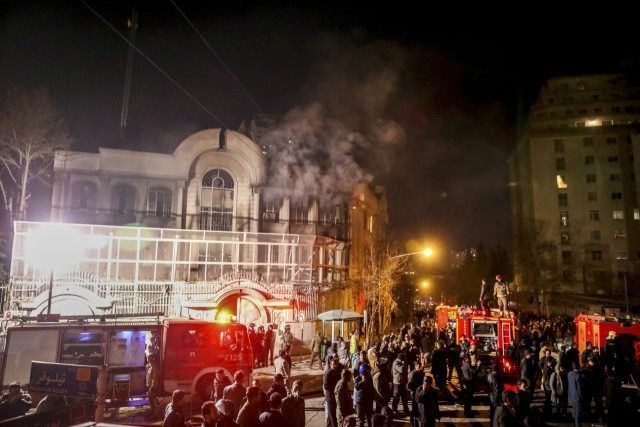The Iranian government has released 152 people arrested in connection with a mob attack on the Saudi Arabian Embassy in January.
“The spokesman for the Iranian judiciary Gholam Hussein Ejani announced in a press conference that 152 detainees were released, while only two are still under investigation, stressing that the stages of the investigation will be announced later,” reported Al Arabiya.
Shiites in Iran attacked the Saudi embassy on January 2 after Saudi officials executed 47 people for terrorism, including prominent Shiite cleric Nimr al-Nimr. Iranian dictator Ali Khamenei tweeted support for the cleric while Iranian Foreign Ministry spokesman Hossein Jaber Ansari said the Saudi kingdom will pay a “high price” for their actions.
Saudi Arabia fired back, pointing out Iran’s numerous human rights violations.
“The Iranian regime is the last regime in the world that could accuse others of supporting terrorism, considering that (Iran) is a state that sponsors terror, and is condemned by the United Nations and many countries,” said a Saudi foreign ministry spokesman in a statement. “Iran’s regime has no shame as it rants on human rights matters, even after it executed hundreds of Iranians last year without a clear legal basis.”
The fight has led to a political split in the Muslim world. Qatar, Djibouti, Bahrain, Sudan, Kuwait, and the United Arab Emirates broke ties with Iran to show solidarity with Saudi Arabia following the attack on the Saudi embassy in Tehran.
Iranians mocked Djibouti on social media after the small country, located in the Horn of Africa, cut ties with Tehran. The users claimed they never heard of the small country before and sarcastically suggested that Iran’s economy will truly suffer without Djibouti’s help.
“Djibouti cut its diplomatic ties with Iran out of solidarity with Saudi Arabia,” declared Foreign Minister Mahamoud Ali Youssouf.
Somalia, another Arab nation in Africa, demanded all Iranian diplomats and employees leave within 72 hours.
“This step has been taken after careful consideration and in response to the Republic of Iran’s continuous interference in Somalia’s internal affairs,” explained the Somalian foreign ministry.
Bahrain’s monarchy is Sunni, but Shias make up the majority of the population. The government claimed that Iran is “increasing … flagrant and dangerous meddling” inside Gulf and Arab states.
Iran blamed the execution on Israel and the United States.
“As with Sheikh Zakzaky in Nigeria, Sheikh Nimr campaigned against the Saudi Wahhabi distortion of Islam and engineered division of the Muslim world along sectarian lines that did not exist prior to the Saudi propaganda, inflamed and fuelled by the West intent on partitioning the region to best serve Israel’s security and Western economic and resource agendas,” stated Vanessa Beeley of the Syrian Solidarity Movement.
She added: “From the reaction of certain US Congress representatives such as Robert Ford to the hideous execution of Sheikh Nimr Bagher al-Nimr by the despotic Saudi regime, it is clear that the Sheikh’s execution is a reaction to the US NATO floundering regime change policies in Syria.”

COMMENTS
Please let us know if you're having issues with commenting.